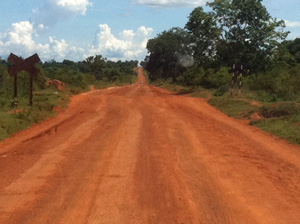
The road to Katakwi
The road to Katakwi is about forty kilometers of washboard and potholes that will test the quality of your dental work. This is one reason why you don’t want to think about driving in Uganda. Francis seems to have radar for parts of the road that seem innocent until you get right over them. As awful as the trip is, I have a special love for this road because of where it leads. Katakwi is the district that includes Usuk, the first IDP (Internally Displaced Persons) camp I ever visited. Six years ago there were still several thousand people there, and there I preached my first sermon in Uganda, to several hundred hopeless farmers. I preached on the parable of the sower and the seed, and in my first words realized I had stumbled by God’s grace into a text they all knew more deeply than I ever could; then I pulled out a couple of puppets and did a homily for about three hundred kids with simultaneous translation into Ateso.
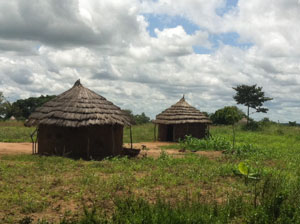 The camp is gone now, and the people have almost all been resettled into traditional lands. Since then, Pilgrim has concentrated on the task of helping them become food-secure. There have been floods and drought and crippling financial pressures that made us pull staff from the fields. Somehow, by the grace of God, we have managed to keep going, and the original vision is at last slowly becoming a reality.
The camp is gone now, and the people have almost all been resettled into traditional lands. Since then, Pilgrim has concentrated on the task of helping them become food-secure. There have been floods and drought and crippling financial pressures that made us pull staff from the fields. Somehow, by the grace of God, we have managed to keep going, and the original vision is at last slowly becoming a reality.
The first element of the vision was to teach sustainable farming techniques and to help villagers recover their connections to their land. This has happened pretty effectively. Farming is practically second nature to Ugandans, and even university professors and bishops have gardens where they grow the staples of Ugandan life: cassava, groundnuts, sorghum, and millet. The next question was how to leverage these practices to help build the economic and social capital of the local communities. The answer lay in the MFP.
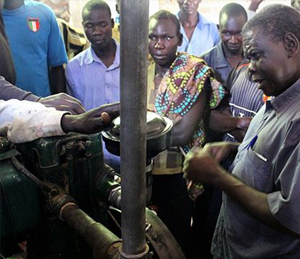
Multi-Function Platform
A Multi-Function Platform is a diesel Lister engine from the colonial period. These British-made workhorses once powered a huge variety of machinery in East Africa from ferries to cotton gins. Adapted to run on biofuel, they can be accessorized to perform the basic functions of food processing: grinding cassava into flour, pressing groundnuts into oil, and so forth. Crops that have been minimally processed in this way are worth up to four times the value of the raw material. By organizing the farmers into co-operatives we also give them group power to negotiate higher prices for their product and help protect them from getting fleeced my middle men. The co-operatives have anywhere from twenty to a hundred forty members, and each is centered around an MFP, though some are not. The next two will be installed by students from Columbia University, through our partnership with Engineers Without Borders, or EWB.
We are visiting the communities chosen as the next two sites. Ten communities were nominated by our field staff as having the potential to organize effectively. They were then visited and analyzed by a combined team from Pilgrim and EWB. The two which came to the top were unanimously chosen.
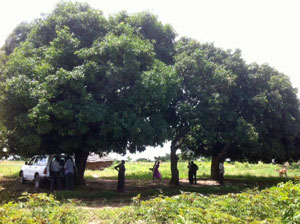
The Meeting Place in Aboiboi
Angella, our head of operations for Soroti, in the company of me, William and James Ochan, is our lead organizer on these visits. The first is a little community called Aboiboi. We pull off the main road after a couple of hours and follow a track through cassava fields and mango trees to the “meeting place”—a lovely shady little grove, where we are to meet the organizing committee. We are met by the committee chair, who sends runners to gather the others from their gardens. After a wait of about fifteen minutes, the entire group is assembled, the committee chair offers a prayer, crossing himself before and after, as do all in attendance, (Katakwi is heavily Roman Catholic) and this done, we begin the meeting.
Meetings in Uganda, from the Ministry of Health in Kampala to the council of the smallest village in Teso, follow a ceremonious protocol that almost never varies: a prayer, introductions, a brief speech of welcome, a brief response from the guests, a series of remarks in careful order of precedence, and then closing formalities. I am always touched by these proceedings. They give the poor the same dignity as cabinet ministers or members of parliament. No one would ever dream of “cutting to the chase”. And in the course of things, a lot of business gets done.
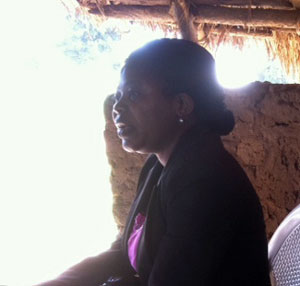
Angella Amuron, Pilgrim Africa Operations Officer
The business today, from Angella’s point of view, is to see how much progress the farmers of Aboiboi have made in holding up their end of the bargain. Pilgrim provides the initial installation of the engine; in return the community itself must provide the land, build the brick shelter for the MFP, organize a sustainable co-operative (complete with officers) by gathering enough subscribing members, and they must (among other things) choose a name for themselves. It has been ten days since the initial meeting with the group, and once we are all seated and her turn has come, Angella asks them a series of pointed questions.
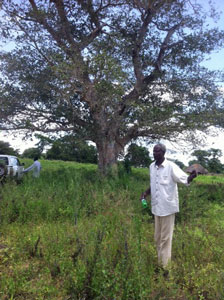
Aboiboi MFP site and donor of the land
She speaks entirely in Ateso, and James Ochan gives me a running translation. Have you identified the land for the shelter? Yes, and the man who is donating it is here, and a very dignified elder stands up. There is a round of applause and we all thank him profusely. Angella tells them to make sure he and they sign the necessary documents to legalize the transaction. She will follow up in another week. She then moves on. How many subscribers do you have? The answer is twenty. How can you get more? We are working on it. Some are reluctant to pay the subscription price of twenty thousand shillings (about eight dollars, no small change for a farmer). The farmers then push back a little. What happens if we cannot raise the funds we need to build the shelter? Angella holds firm. You understood the terms when we first met and you agreed to them. We believe you can do it. The committee digests this. Then she asks, Have you chosen a name? They demure, but by the smiles and the animation she is re-assured that this is an administrative problem more than anything. She goes over the schedule and the agreement, and she inspects their journal to make sure they are making progress, have duly recorded the membership and the fees collected so far. At some point in the middle of this the Bishop is introduced, and I do my best to support what Angella has laid out. James translates for me. After opening with the expected expressions of appreciation, I decide to address the two issues of the subscriptions and the name. I ask hypothetically, what would happen if Pilgrim just said, OK don’t worry about the shortfall—just raise what you can and we’ll provide the rest? They all laugh and applaud. There would be great happiness, they say. Yes, I say, perhaps, for about a month, but then what would happen? The smiles fade. I point out there is an empty World Vision school near Dakabela, entirely paid for by Americans, and never occupied because the community had no stake in it; there is a diesel generator at the clinic in Amuria, German-made and paid for by British charities, that has never been fired up, for the same reason. Uganda is covered with rusting machinery bought by Westerners and never put into practice because the people themselves did not create it. If you don’t subscribe, I conclude, the thing may begin, but it will not continue. They nod their heads and several reinforce the point among themselves.
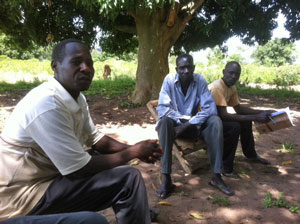
Co-op Officers
Now about the name, I ventured. What would happen if you all just stopped naming your children? The babies grew up and all they heard was, “Hey you! Come here!” Again, general laughter. There would be chaos, says one young mother. Yes, I agreed, and more than that the children themselves would never really know who they were. If you are going to thrive in life, you have to know who you are, and that begins with a name. I look forward to hearing yours, so that I can remember you in my prayers when I return to the States. The meeting ends with a great deal of appreciation, and on our way out we stop by the intended site with the donor and the committee chair: It is perfect, under a lovely tree, centrally located, a piece of land well known by the community. Again, thanks, handshakes, murmurs of respect, and we’re off.
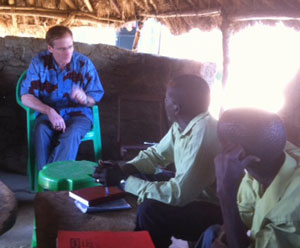
Talking with the officers in Angole-Kyere
The next community is on the other side of Soroti, in Serere District, so we drive back the two hours to the town and head up a slightly less challenging road until we arrive at Angole-Kyere. The meeting here progresses in exactly the same sequence, except the prayer is an enthusiastic free-form invocation (everyone here is either Pentecostal or Church of Uganda). This community has clearly more capacity than the one in Katakwi. The entire session is conducted in English. They have raised one hundred forty-seven subscriptions. They have the land, again donated, and also donated bricks, lintels, and other materials. They have chosen the name Angole-Kyere Agricultural Co-operative. The meeting goes quickly. When it comes to me, to my surprise, I tell them about my first sermon in Uganda, the one in Usuk, about the sower and the seed.
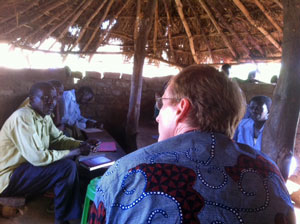 I remind them that in those days there was utter hopelessness everywhere. People could not believe their suffering would ever end, or see how life could ever improve. I said that Teso had been through the path, the thorns and the stony ground; but that even in those days, God was planting the seed of his hope in the fertile ground of their hearts. He watered it through the years of affliction, and now we can see it growing in front of our eyes. As they nodded appreciatively, their eyes showed that they were recalling their own personal histories of hardship, and now saw that they stood in a place where a real future for them and their children, like good seed, finally was in their hands.
I remind them that in those days there was utter hopelessness everywhere. People could not believe their suffering would ever end, or see how life could ever improve. I said that Teso had been through the path, the thorns and the stony ground; but that even in those days, God was planting the seed of his hope in the fertile ground of their hearts. He watered it through the years of affliction, and now we can see it growing in front of our eyes. As they nodded appreciatively, their eyes showed that they were recalling their own personal histories of hardship, and now saw that they stood in a place where a real future for them and their children, like good seed, finally was in their hands.
